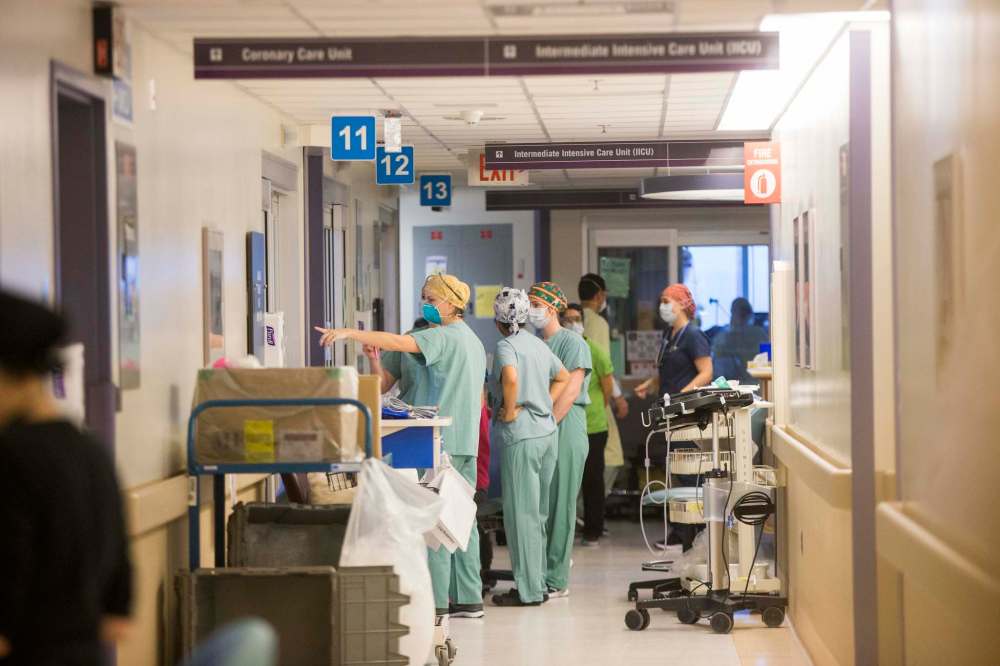Trial by fire: ICU training capped by COVID
As pandemic struck, nurses learning intensive care thrust into critical situations; province working to improve education
Advertisement
Read this article for free:
or
Already have an account? Log in here »
To continue reading, please subscribe:
Monthly Digital Subscription
$0 for the first 4 weeks*
- Enjoy unlimited reading on winnipegfreepress.com
- Read the E-Edition, our digital replica newspaper
- Access News Break, our award-winning app
- Play interactive puzzles
*No charge for 4 weeks then price increases to the regular rate of $19.00 plus GST every four weeks. Offer available to new and qualified returning subscribers only. Cancel any time.
Monthly Digital Subscription
$4.75/week*
- Enjoy unlimited reading on winnipegfreepress.com
- Read the E-Edition, our digital replica newspaper
- Access News Break, our award-winning app
- Play interactive puzzles
*Billed as $19 plus GST every four weeks. Cancel any time.
To continue reading, please subscribe:
Add Free Press access to your Brandon Sun subscription for only an additional
$1 for the first 4 weeks*
*Your next subscription payment will increase by $1.00 and you will be charged $16.99 plus GST for four weeks. After four weeks, your payment will increase to $23.99 plus GST every four weeks.
Read unlimited articles for free today:
or
Already have an account? Log in here »
Hey there, time traveller!
This article was published 05/04/2021 (1706 days ago), so information in it may no longer be current.
Just before the pandemic hit, training for critical care nurses was shortened in Manitoba.
Now, amid concerns about a third wave and rapidly spreading variants of COVID-19 that are landing a higher proportion of Manitobans in intensive care, health officials say they’re trying to improve orientation for new nurses before they’re expected to start working with the sickest patients.
The first class of nurses to undergo the condensed four-month program was formed in April 2020. Previous training programs were six months to a year in length for nurses who wanted to learn the specialty.

The students, all of them qualified nurses with a minimum one year of experience in acute medicine, now complete an American-based online module for approximately two months, and are meant to spend the rest of their critical care education completing various forms of on-the-job training under guidance from other nurses and educators.
But as COVID-19 burdened the provincial health system, demand on intensive care units intensified, and there wasn’t enough time to complete the practicum portion of the course and learn from senior nurses before being tasked with monitoring one or more patients, one ICU nurse told the Free Press.
The nurse said she was assigned to monitor two patients during one shift early on, after she finished the online course, during the pandemic’s second wave. It’s a practice known in nursing as doubling up, instead of the standard one-to-one nurse-to-patient ratio.
“It’s just kind of like playing with fire a bit when we have really new staff doubled on their own alongside with other staff who are also doubled on their own, even if those nurses have tons of experience,” the nurse told the Free Press in interview, speaking on the condition of anonymity.
In a statement, a spokesperson for Shared Health said changes to the critical care education program — now called an orientation program — were planned to “modernize” the course, so trainees could go directly into their chosen specialty (medical, surgical or cardiac care).
Each of those units requires specially trained nurses.
Shared Health has said the nurse-to-patient ratio is still one-to-one for the most critically ill patients, although nurses who work in the unit have said it hasn’t been uncommon during surges to be assigned to more than one COVID-19 patient even when all patients are extremely ill.
Another class of 36 critical care nurse trainees is set to begin in April.
Since April 2020, 94 nurse trainees have enrolled in the program; 89 of them graduated and are working in ICUs, Shared Health said.
Improvements to critical care orientation are ongoing for new staff and nurse extenders (nurses who don’t specialize in critical care but were sent to temporarily fill in), Shared Health said.
“Orientation for nurse extenders included a blend of complex critical care theory, technical lab skills, and clinical orientation in a buddied learning environment. Work is ongoing to further evolve the program with additional educational content and supports as opportunities to strengthen orientation are identified. Other supports available to staff include stress management debriefing, site-wide mental wellness services, quiet zones and access to spiritual health teams,” the statement said.

The College of Registered Nurses of Manitoba doesn’t approve or review specialty, post-graduate education programs for nurses (except for graduate nurse or graduate nurse practitioner programs), and it hasn’t received specific complaints about critical care education, a spokesperson for the regulatory body said.
Nurses did reach out, however, with concerns about practising in a pandemic.
“We have had some inquiries where our staff provided guidance on how to meet standards during a pandemic, which may have included critical care. However, the focus was not on the education the nurses received to become critical care nurses,” the college spokesperson wrote in an email.
NDP health critic Uzoma Asagwara said the Manitoba Opposition has heard from several nurses, some new and some veteran, all of them expressing similar concerns.
“Consistently, the concerns that have been reiterated to me are that they are not being equipped with an adequate amount of time and on-site experience before being expected to deliver direct patient care in what is an incredibly acute and high-stress and unique medical situation in this pandemic.”
katie.may@freepress.mb.ca
Twitter: @thatkatiemay

Katie May is a general-assignment reporter for the Free Press.
Our newsroom depends on a growing audience of readers to power our journalism. If you are not a paid reader, please consider becoming a subscriber.
Our newsroom depends on its audience of readers to power our journalism. Thank you for your support.




